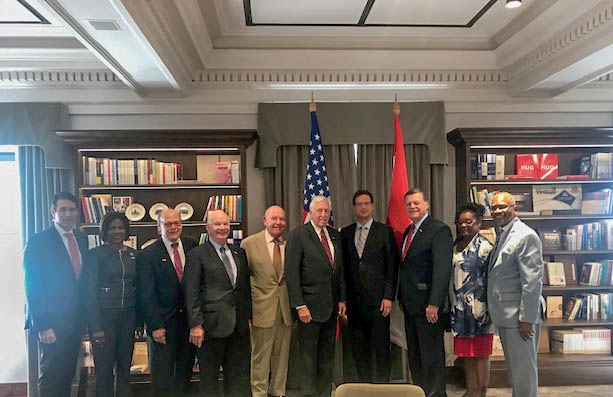Steny Hoyer
Helsinki Commissioners, Other Members of Congress Jo...
Sep 21, 2020WASHINGTON—On September 22, 2020, Helsinki Commission Chairman Rep. Alcee L. Hastings (FL-20), other Helsinki Commissioners, and select members of Congress will join members of the European Parliament’s Civil Liberties Committee […]
Helsinki Commission Leaders Commemorate 30th Anniver...
Nov 08, 2019WASHINGTON—Ahead of the 30th anniversary of the fall of the Berlin Wall on November 9, Helsinki Commission leaders issued the following statements: “In 1989, history hit the fast-forward button; what […]

House Majority Leader, Helsinki Commissioners Decry ...
Aug 19, 2019WASHINGTON—Following renewed efforts by authorities in Hungary to shutter the Aurora Community Center in Budapest, House Majority Leader Rep. Steny H. Hoyer (MD-05), Helsinki Commission Ranking Member Sen. Ben Cardin […]

HELSINKI COMMISSIONERS VISIT HUNGARY
Jul 17, 2019Pictured: Mate Szabo, Hungarian Civil Liberties Union (left) meets with Representative Tom Cole (right). From July 1 to July 3, three members of the U.S. Helsinki Commission visited Hungary as […]
Delegation Led by Co-Chairman Wicker Demonstrates U....
Jul 10, 2019WASHINGTON—From July 4 to July 8, Helsinki Commission Co-Chairman Sen. Roger Wicker (MS) led the largest bipartisan, bicameral U.S. delegation in history to the 2019 OSCE Parliamentary Assembly (OSCE PA) […]
Countering Hate: Lessons from the Past, Leadership f...
Jul 05, 2019Today at the 28th Annual Session of the OSCE Parliamentary Assembly in Luxembourg, Helsinki Commission Ranking Member Sen. Ben Cardin hosted a U.S. side event in his capacity as OSCE […]

In Memoriam: Karen Lord (1967-2001)
Jan 29, 2018By Nathaniel Hurd, Senior Policy Advisor “All we have to decide is what to do with the time that is given us,” Gandalf says to Frodo in The Fellowship of […]

40th Anniversary of the U.S. Helsinki Commission
May 26, 2016Mr. CARDIN. Mr. President, on June 3, 1976, U.S. President Gerald Ford signed into law a bill establishing the Commission on Security and Cooperation in Europe, more commonly known as […]
Anti-Semitism, Racism and Discrimination in the OSCE...
Jul 22, 2014This briefing was attended by the Hon. Benjamin L. Cardin, Chairman of the Commission on Security and Cooperation in Europe (Helsinki Commission); the Hon. Alcee Hastings, Ranking Member of the […]
Cardin to Speak at Conference on Katyn Massacre
Apr 28, 2010WASHINGTON—U.S. Senator Benjamin L. Cardin (D-MD), Chairman of the Commission on Security and Cooperation in Europe (U.S. Helsinki Commission) will speak Wednesday at 10 a.m. at a conference at the […]
Embassy Row: Wall Fallout
Nov 06, 2009A Democratic congressman this week used a celebration of the 20th anniversary of the fall of the Berlin Wall to criticize President Obama for failing to nominate a U.S. ambassador […]
“Where Walls Still Stand” — Commission Marks 2...
Nov 04, 2009WASHINGTON – Twenty years after the fall of the Berlin Wall, leaders of the U.S. Helsinki Commission said Wednesday the U.S. must lead the fight against modern tools of repression […]
